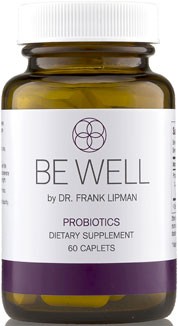There has been so much hype surrounding probiotics lately. In fact an article just came out in the New Yorker that explained that antibiotics not only kill bad bacteria, but also good bacteria and underlined the benefits of taking probiotics so that you can replenish your body with good bacteria (this is especially important now that we’re getting into flu season). I’ve been doing a ton of research these last few days and the amount of information out is overwhelming. Shopping for vitamins in general can be very confusing, especially because of tremendous price differences and unregulated terms like “premium.” I’m a huge fan of Dr. Lipman (his blog is one of the most informative for health/wellness info), and just started taking his probiotics. I also recently went to a launch event for Optimal Solutions (a new range of supplements and protein mixes designed specifically for women), and am now taking their Hair, Nail, and Skin supplement in addition to Solaray Vitamin D, Calcium, and Magnesium supplements I was already taking….let’s see if I can see a difference in the next month or two!
In my quest to put together the optimal nutritional supplement regimen I spoke with Melissa O’Shea MS, RD, the national nutrition director for Exhale Spa. She had some incredibly insightful things to share. See below!
How do you suggest people take nutritional supplements – with or without food? Does it depend on the kind?
Most supplements should be taken with food. One reason is that having food in your stomach will help to decrease stomach upset or heartburn that can be caused with some supplements, such as iron or a multivitamin. The other reason is that fat-soluble vitamins, for example, need fat for absorption. Ideally you want to take your multivitamin, vitamin D pill (fat-soluble vitamin) and fish oil supplement (essential fatty acid) with a meal that contains fat to allow for adequate absorption.
When you’re meant to take two or three of a particular supplement, does it make a difference if you take them at the same time or do you have to spread them throughout the day for max efficacy?
This will depend on the supplement. Vitamin D for example, you can consume it any way you want from taking a large does once a week to spreading out a dose throughout the day. D is a fat-soluble vitamin, which means we can store it in our body and therefore won’t excrete any excess amount we might take in. Water-soluble vitamins, on the other hand, we do not have storage capability for and therefore we need to consume them daily. As opposed to Vitamin D, which you can take on a weekly basis, you would want to consume vitamin C and B-vitamins, such as folic acid, on a daily basis. Calcium is another supplement to consider. Our body can only absorb 500mg at once and the recommended intake for most adults is 1,000mg. In order to absorb the full 1,000mg you would want to take 500mg in the morning and 500mg in the evening. Most supplements are packaged this way (500mg in one pill). Don’t purchase ones that contain 1,000mg/pill, as you will only absorb half anyway.
Any supplements that you recommend everyone take?
Studies suggest the majority of the American population is deficient in Vitamin D. You can find out where you stand from a simple blood test. I therefore recommend that most people consider taking a D supplement. Vitamin D can be hard to find in our food supply and while we can produce D from the sun, most of us aren’t spending enough time in the sun and the use of sunscreen will prevent our D production. Women who aren’t meeting their calcium needs may want to consider taking a calcium + vitamin D supplement to support bone health and reduce the risk of osteoporosis. For those who don’t eat at least two servings of fish per week, or if you are at high risk or have a family history of heart disease, I would recommend taking a daily omega-3 supplement.
There is so much hype about probiotics. What are your thoughts? How do you shop for them? Does “premium” actually mean something?
With cold and flu season upon us, I think taking daily probiotics is a smart idea. For those who suffer from digestive issues I would also recommend considering adding a probiotic to your diet. The first thing you want to look for is a supplement that lists the names of the bacteria that are present. You also want to make sure an effective strain of probiotics is included. Lactobacillus acidophilus is a common strain that has been proven to be beneficial in the body. The amount of bacteria the pill contains is also listed. A common effective dose usually includes anywhere from 10-20 billion cells.
Some probiotics have to be refrigerated. Is the refrigerated vs not a reflection of quality?
No and probiotics you don’t have to refrigerate offer more flexibility, as you can keep them at work or bring along while traveling, which is a time your immune and digestive system can both use some help.
There is such a massive price difference with supplements. What should we be looking for?
More expensive doesn’t necessarily mean healthier or better for you. Do your research and look into a brand before you purchase it. You just want to make sure your supplement is free of contaminants and synthetic fillers. Depending on your dietary needs you may want to also look for supplements that are gluten free, dairy free or vegetarian. New Chapter is one company that makes high quality supplements.
Taking any supplements? Please share!








Thank you for this post. I just went to the store yesterday to buy vitamins so it is perfectly timed for me. I bought a skin, nails, hair and am hoping it makes a difference! I haven’t looked into probiotics yet, but I definitely will now.